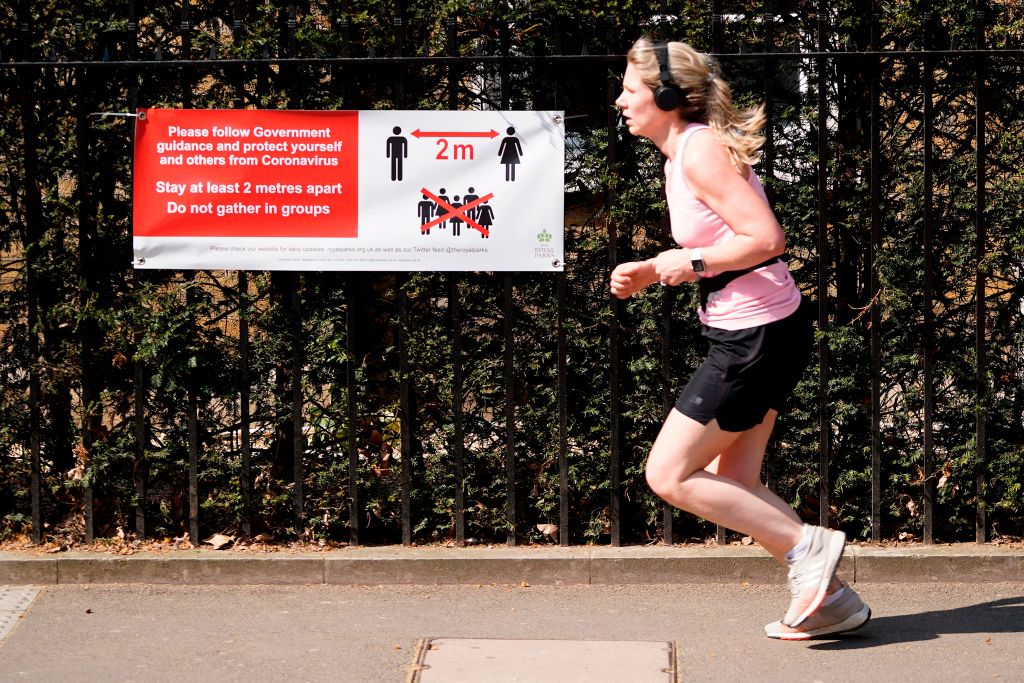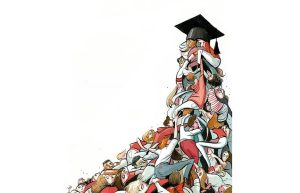Should our future permit an occupation so frivolous, historians years from now will make a big mistake if they blame the nauseating plummet of global GDP in 2020 directly on a novel coronavirus. After all — forgive the repetition, but certain figures bear revisiting — COVID’s roughly 290,000 deaths wouldn’t raise a blip on a graph of worldwide mortality (reminder: 58 million global deaths in 2019). COVID deaths will barely register in the big picture even if their total multiplies by several times.
For maintaining a precious sense of proportion, check out some other annual global fatalities: influenza, up to 650,000. Typhoid fever, up to 160,000. Cholera, up to 140,000. Malaria, 620,000 in 2017, almost all in Africa (so who cares, right?). In 2018, tuberculosis, developing treacherous antibiotic resistance, killed 1.5 million people. Why haven’t we closed down the whole world for TB?
What is destroying lives and livelihoods is not predominantly the illness. The UK economy is not in a tailspin because it can’t survive without the labor of the 32,000-plus fatalities, however much we may miss them as individuals. This is not a natural disaster but a manmade one.
I’ll not bore you with the data (that’s what Toby Young is for), but evidence abounds that lockdowns have had a negligible effect on the arc of national infections. (In a recent sampling, the majority of COVID patients admitted to New York hospitals were sickened while ‘sheltering in place’. A growing number of New York doctors want restrictions lifted.) Thus Boris’s new motto importuning us to ‘control the virus’ seems especially ludicrous, given that this infection, if we’re to indulge in ever-popular anthropomorphizing, clearly has a mind of its own.
Politics, as opposed to science, does not reward the correction of mistakes, given that correcting a mistake also entails admitting to having made one. Worse, the bigger the mistake, the greater the political urgency of defending it at all costs. Boris and co are therefore obliged to keep justifying the lockdown, which means continuing to exaggerate the contagion’s risk to life. (Case in point: in Sunday’s address to the nation, the PM reiterated Professor Pantsdown’s forecast of 500,000 fatalities, although that modeling has been much discredited. In obeisance to this official Blitzy version of events, the British public is now doomed to act out an elaborate theatre of medical paranoia, because to relax social distancing is also to suggest that maybe much social distancing was dumb to begin with.
I am steeped in dread. I foresee months, if not years, of inane gesturing towards ‘safety’ that makes no appreciable difference to the nation’s health, but does manage to 1) ruin everyone’s enjoyment; 2) perpetuate the socially poisonous notion that one’s neighbor is a threat to one’s very life; 3) maintain an atmosphere of the extraordinary, in which the state may violate civil rights at will; 4) lay waste to what little might otherwise have remained of this country’s economy. The lockdown has been bad enough. Post-lockdown could be worse.
Is there any real science behind this two-meter rule? Or is it an arbitrary convention we’re now stuck with? Recent research suggests that COVID is surprisingly nosocomial (what a wonderful word): spread in the healthcare settings of care homes and hospitals. We’ve also learned that most infections result from the close-up, sustained exposure that we never get with strangers in supermarkets. Yet the two-meter rule that’s consigned us to half-mile lines for the store will soon make everywhere else unbearable, too.
With narrow profit margins, restaurants can’t survive serving a fraction of their previous clientele. Half of all UK pubs are already kaput, and the other half will soon go under if lone customers self-isolate over their drinks like sullen alcoholics. Plenty of manufacturing won’t function with employees so far apart. The arts are finished. West End theaters with audiences a third their former size will close. The Albert Hall is also looking at social-distancing bankruptcy, as well as considering the banning of intervals because the loos will have to be shut (sounds relaxing). The Royal Opera House’s streaming of Swan Lake without a live audience makes no money.
***
Get three months of The Spectator for just $9.99 — plus a Spectator Parker pen
***
Oh, and transport! In London, social distancing is expected to reduce Tube passenger numbers by 90 percent. Five million people daily ride the Tube, or used to, so how are the other 4.5 million meant to get around? By bicycle. Right. Now, I can assure you that pre-COVID it was already a nightmare to cycle in the capital, as chocka with two-wheelers as the old Shanghai. But forget buses, allowed to carry 15 percent of their previous ridership. We’re told that to get into a sparsely populated lift, we may have to make a reservation on an app. But never fear. I guess we could always throw ourselves off the balcony instead. Why, with the masky, glovey, get-away-from-me future we’re all facing, taking that shortest route to the pavement starts to appeal.
Worst of all, lest some sector somewhere still struggles back to solvency, we’ll now order air passengers from abroad to ‘quarantine’ for a solid two weeks straight off the plane. Because passengers can promise to quarantine themselves in a particular location, this policy comes with obvious enforcement problems. Quarantines will either be roundly ignored (so what’s the point?), or they’ll require extravagant police resources to keep rapping on doors to ensure some visiting Canadian didn’t nip out for a pint of milk. What this policy is guaranteed to achieve is the total devastation of both the British tourist industry and British airlines, especially since the business travel on which aviation depends will evaporate.
I predict that few of the tedious, costly, time-consuming measures about to be levied on the British public in the coming months will be based on science. We’ll be obliged to make loud gestures of showy compliance, most of which will make no difference to who sickens and who dies, but which will nevertheless irretrievably deep-six the UK economy and make our daily lives an unremitting misery.
This article was originally published in
The Spectator’s UK magazine. Subscribe to the US edition here.


















